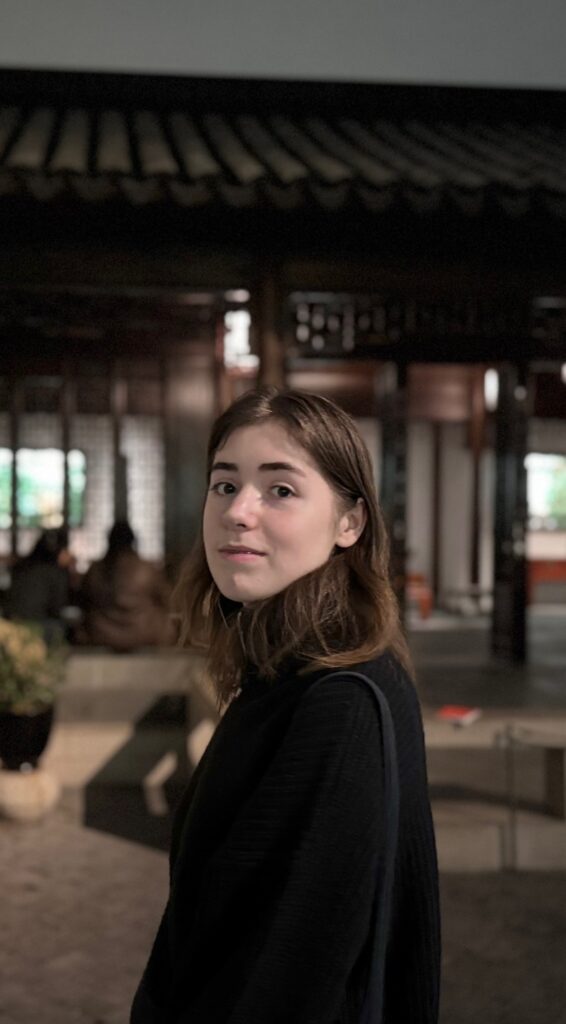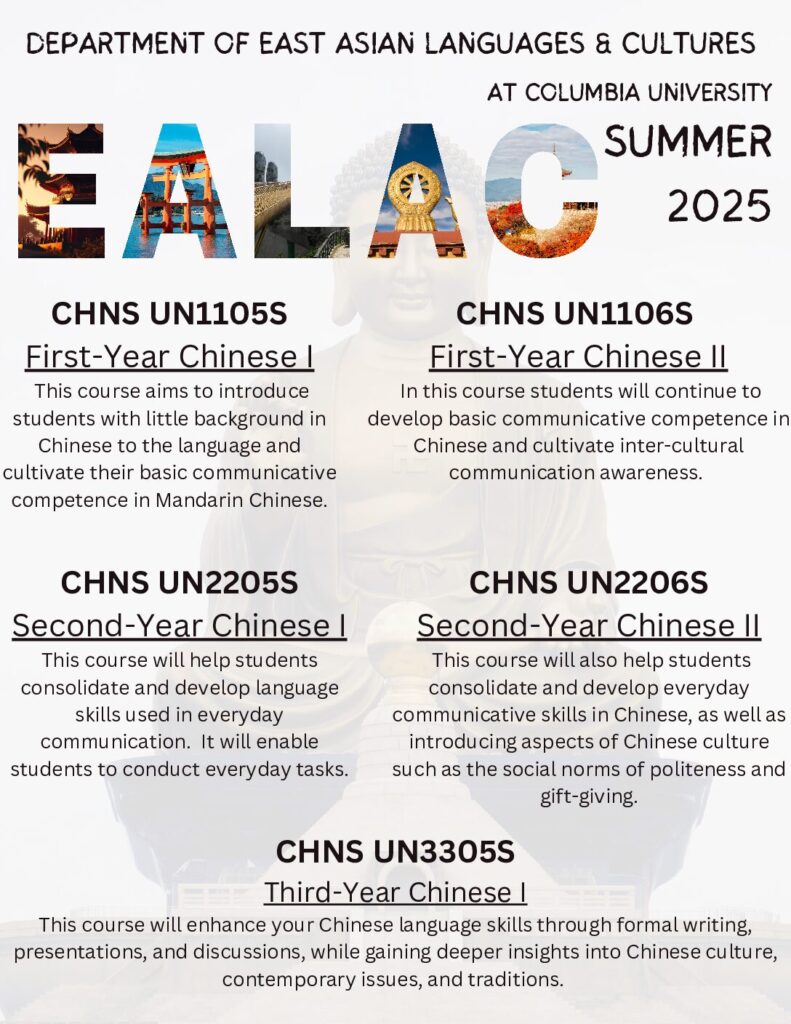
Please see the attached document for the most up-to-date list of EALAC courses for Fall 2025.
Filed Under: Featured Spot
Announcement:

Please see the attached document for the most up-to-date list of EALAC courses for Fall 2025.
Filed Under: Featured Spot, Uncategorized
Please join us in congratulating our undergraduate 2024-25 Senior Thesis writers for all of their hard work and efforts in the Senior Thesis Program! These students did an outstanding job and will receive the Oscar Lee Award for Senior Thesis Writers for their achievements.

Bio: Anna Qiang is a member of the Columbia College Class of 2025 majoring in East Asian Studies. Her academic interests focus on modern Chinese history, particularly Shanghai during the Republican period, and the interplay between British and Chinese political and economic systems. Beyond her primary field of study, Anna also enjoys conducting legal research and producing music. After graduation, she aims to leverage her interdisciplinary knowledge to contribute meaningfully in global contexts of business and law.
Anna’s senior thesis, “Examining British Imperialism: The Chinese Bourgeoisie and Nationalist Resistance in Shanghai from 1920–1939,” written under the supervision of Professor Eugenia Lean, explores how the Chinese bourgeoisie navigated economic ties with British imperial powers while fostering nationalist resistance.
Abstract: This thesis examines the relationship between the Chinese bourgeoisie and the Kuomintang (KMT) in Shanghai from 1920–1939, focusing on the dynamics of British imperialism, Chinese nationalism, and capitalist growth. As Shanghai emerged as an international financial and commercial hub, foreign settlements such as the British-dominated Shanghai International Settlement played an important role in shaping the city’s modernization. This district introduced Western banking systems and governance structures, fostering a complex environment that facilitated the rise of the Chinese bourgeoisie.
This paper argues that the Chinese bourgeoisie, as a rising economic class, navigated their dual role: leveraging commercial ties with the British while aligning with nationalist resistance against imperialism. Through an analysis of primary sources, including British political and economic reports, anti-British propaganda posters, and postcards depicting early 20th-century Shanghai, this thesis examines how the KMT simultaneously relied on and sidelined the bourgeoisie. While the bourgeoisie supported KMT initiatives financially, their exclusion from governance reveals the KMT’s strategy of consolidating state power over capitalist interests. By fostering anti-imperialist sentiment and economic independence, the KMT used its paradoxical relationship with the bourgeoisie to establish a nationalist political order and resist British dominance.
This research highlights the Chinese bourgeoisie’s pivotal role in reshaping Shanghai’s socio-political fabric, showcasing to scholars new perspectives on modern political identities and the legacy of imperialism in early 20th-century Shanghai.

Bio: Helena Han is a member of Barnard College’s Class of 2025, majoring in East Asian Studies with a minor in History. Her area of interests is Chosǒn and Ming-Qing history, with a focus on gender, language and material culture. Outside of the classroom, Helena enjoys Japanese and Korean pop music, practicing calligraphy, and cooking. After graduation, she plans to continue her research in Columbia EALAC department, where she hopes to further explore women and cultural history in early modern Korea.
Helena’s senior thesis, “Divorcing the ‘Defiled’: Brought-Back Women and the Politics of Chastity in Seventeenth-Century Chosǒn,” written under the guidance of Professor Jungwon Kim, examines how the Chosǒn state and elite families marginalized women ransomed from captivity after the Manchu invasions, as part of a broader effort to reconstruct cultural identity following the fall of Ming China.
Abstract: This thesis examines the evolving discourse on chastity, martyrdom, and exclusion in seventeenth-century Chosǒn Korea through the case of brought-back women—those captured during the Manchu invasions and later ransomed back to Chosǒn. While the state glorified chaste women who chose death over dishonor, it increasingly treated brought-back women as morally defiled and unfit for reintegration. I argue that this exclusion was not a natural outgrowth of Neo-Confucianization or chastity ideals, but a historically specific response to Chosǒn’s post-Ming identity crisis. As Chosǒn reimagined itself as the last bastion of Confucian civilization after the Ming collapse, chastity became a symbolic language of cultural purification, and women’s bodies became sites of moral anxiety.
Through close analysis of court petitions, literati writings, familial epitaphs and postwar literature, this study reveals how state, scholar-officials, and elite families strategically mobilized chastity and Confucian rhetoric to construct a moral binary between martyrdom and survival. By tracing the ideological, institutional, and mnemonic mechanisms through which brought-back women were stigmatized and erased, this study not only contributes to the historiography on post-invasion Chosǒn identity formation but also complicates our understanding of gendered commemoration and cultural authority in early modern East Asia.

Bio: Ichiro Ng is a member of the Columbia College Class of 2025 majoring in East Asian Studies. Ichiro’s current areas of interest are Japanese literature, theater, and folklore studies. He is currently writing a thesis on Kyōgen, a form of traditional comic theater. In the future, Ichiro hopes to pursue a career in academia.
Abstract: Kyōgen, which can be literally translated as “wild words,” is a Japanese comic theater form characterized by its slapstick humor, parody, and in many cases lightheartedness. Central to Kyōgen is the mimetic interaction between characters, in which a given character would imitate and repeat the actions or words of another. Such imitation generates much of the humor in Kyōgen, where the humor present in mimetic behavior is underpinned by establishing and dismantling hierarchical relationships between the characters. Examining the mechanism of mimesis in Kyōgen will reveal the theatre form’s depiction of hierarchy and power, and how such structures are negotiated within the plays. This thesis seeks to put forth an argument regarding the general function and role of mimesis in Kyōgen as a theatre form. It will propound the argument that imitation in Kyōgen, in its narrative level, does not necessarily signify mimicry in which the imitator would mock and ridicule the figure being imitated. Rather, imitation on the most general level, functions to render the figure who imitates as a fool and an object of laughter. Such imitation is never perfect; to the extent that it is imitation and not transformation, the act of mimicking is necessarily a failure, which makes the imitating figure a fool to laugh at. Imitation becomes a gateway for the characters of higher positions to bring themselves down to the level of stupidity, which then functions to bring an element of festivity to Kyōgen plays.

Bio: Sophie Dodds is a member of the Columbia College class of 2025, majoring in East Asian Studies with a particular focus on late imperial Chinese literature. Her research interests include reading culture and novel theory. Outside of her studies, Sophie enjoys creative writing, painting, and cats. After graduation, Sophie will return to Columbia to join the EALAC PhD program in the fall, where she will be studying late imperial Chinese literature under the guidance of Professor Shang Wei, who also advised her senior thesis, “The Book in Motion: Reading, Rewriting, and Metanovel in The New Quelling the Demons’ Revolt (1620).”
Abstract: This thesis examines Feng Menglong’s Xin Pingyao zhuan (1620) with new attention to the ways in which Feng rearranges the narrative around the opening, transmission, and closing of a heavenly book. By placing Feng’s depictions of the heavenly book in conversation with contemporary late imperial discourses on print and the reading of novels, I seek to show that we may engage the Pingyao zhuan not simply as a failed revision, or as a pastiche of excavatable textual sources, but as a novel whose book-within-a-book framework offers a highly self-conscious commentary on the processes of reading, materiality, and textual re-creation. The Pingyao zhuan puts forth a “life cycle of the book”—and in doing so, both reflects on its own genealogy and anticipates its fate at the hands of future readers.

Bio: Ruby Momo Kaminsky is an East Asian Studies major and member of the Barnard College Class of 2025. During her time at Barnard, she took select courses in the Anthropology Department, which sparked her interest in the larger historical forces that reciprocally shape the structures of society and habitus. In addition to her Japanese and Chinese language studies, Ruby spent her first three years of college studying Italian, which enabled her to study abroad in Bologna, Italy. During her time in Bologna, she became fascinated by the shared cultural emphasis on family values, food, and the domestic roles of women, which she recognized from her time living in Japan.
Her research focuses on the Second Wave Women’s Liberation Movement of the 1970s (Ūman Ribu), examining its portrayal of domesticity in magazines targeted at Japanese housewives. Under the advisement of Professor Max Moerman, she has written her thesis “Domestic Dame or Capitalist Acclaim? Articulations of a Radical Feminist Movement, an Economic Boom, and a Postwar Mentality Shift in Japanese Periodicals of the 1970s.” In this work, she investigates how the intersection of Japan’s post-war economic boom, a national reconfiguration of identity, and the 1970s women’s liberation movement were reflected in the narratives of media for women’s consumption. After graduating, Ruby plans to pursue her passion for cooking and recipe development, carrying forward the critical thinking and interdisciplinary insights imparted… especially as learned through this thesis writing process!
Abstract: This thesis explores how female autonomy can be gained through domestic practices and, further, how female autonomy is derived from the consumption of domestic depictions in women’s periodicals. In my analysis of Shufu no Tomo (1917-2008) and Fujin Kōron (1916-present) – two long-running magazines that catered to housewives centered on the cultivation of domestic life – I consider how these magazines may have contributed to a sense of liberation. The Ūman Ribu movement (loanwords from ‘Woman’ and ‘Liberation’) was a radical feminist movement (1970) which emphasized the importance of access to birth control, freedom of female sexuality, and the emancipation of women from the role of the mother; it ultimately led to the reconsideration of what was thought to be expected of women. The 1968 and 1970 publications of Shufu no Tomo and Fujin Kōron illustrate the evolution of the homemaker in Japan, specifically focusing on how socio-historical and economic factors shaped the ideal of the Japanese domestic woman. The influence of the American Occupation and its facilitation of the postwar mentality affected the lives of Japanese women, Japanese families, and, in turn, the greater rhetoric circulated in Japanese society. With all of these intricacies in mind, this thesis examines how the characterization of the Japanese woman as “selfless and subservient” (Donald Keene, Fujin Kōron 1968) perpetuated the adherence to gender roles and societal expectations associated with the home. Why might this characterization have felt necessary? How did this remarkably generative era feed off of female domesticity? In analyzing these long-running journals dedicated to domestic audiences, I explore the insights that connote a sense of somewhat restricted agency for Japanese housewives. In these domestic publications, we can see that economic success and the reclamation of national pride were fostered, in part, through the structure of the Japanese family between 1968 and 1970. I aim to illuminate the intersection between domestic media published during a time period informed by the burgeoning aspirations of female liberation. These dynamics were imbued with the transforming social, political, and economic shift of the postwar era. My question remains, how did the nascent feminist consciousness of the 1970s appear in these periodicals for female audiences, and how did the prevalent socio-political discourse materialize within their pages?
Filed Under: Featured Spot

Please see the attached document for the most up-to-date list of EALAC courses for Summer 2025. Be sure to check them out before your next registration period!

EALAC – Columbia University
407 Kent Hall 1140 Amsterdam Ave.
MC 3907 New York, NY 10027
tel:212.854.5027
